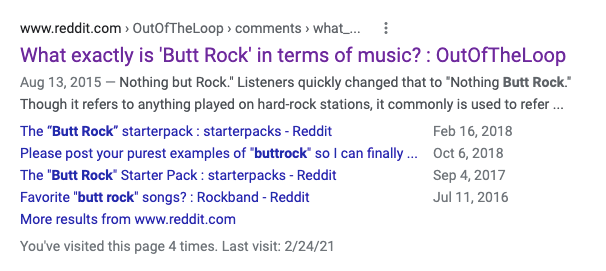Last night I sought the truth: I wanted to confirm the accuracy of the statement “Jenny Humphrey wound up in a butt rock band.” And what I found, well: it shocked me.
If you’re not familiar with the term “butt rock,” know that it’s a staple of white middle American mass culture, a remnant of what happens when monoculture dictates that everybody likes something that few people actually seem to enjoy. Here in the midwest, those of us who clearly remember the previous century have a general idea of what butt rock is, even if we’ve only heard the term once or twice before. Butt rock is what you hear when you’re driving through Ohio, your cd/tape player is busted, and you can’t find a decent radio station until you reach the Chicago frequencies. Like porn, when you hear it, you know: that’s butt rock.

I’ve been in many a dive bargument about what generally constitutes butt rock, and I’m often wrong, which is why I Googled “butt rock” in the first place. Turns out I'm among the 5,800 Americans that Google is misinforming every month about Butt rock.
If Google were the kind of search engine that hung out at a dive bar, it would have been shouted down with these poor examples, from Urban Dictionary, Reddit and the Houston Press, at results 1, 2 and 3, respectively:
- “Examples of butt rock bands include Five Finger Death Punch, Three Days Grace, Buckcherry, Nickelback, Disturbed, and Three Doors Down.”
- “Think of Puddle of Mudd, Theory of a Dead Man, Seether, Breaking Benjamin and bands like that. Basically middle of the road, not too edgy to be rock but not catchy enough to be pop music.”
- It’s a listicle that reiterates the bands above and adds Thirty Seconds to Mars, Seether, Puddle of Mudd, and Anberlin.
If you’re operating from the same cultural reference point as I am, you read those results and say, “Uhhhh, naw, man. Butt rock is bigger than that.” Like, I love mocking Nickelback and shriek with laughter at Look at this graph, but the historical significance of butt rock begins long before those Canadian turn-of-the-century meatheads. Technically, all of these bands qualify as butt rock, yes, but are extremely late-era butt rock/millennial examples.

What was butt rock before Google?
As a devoted student of rock culture who pored over Spin and Rolling Stone in the 1990s, I know butt rock is a distinctly Gen X phenomenon, a term used to describe rock radio that was not grunge or alt rock in the late '80s and early '90s.
We all know gender is a construct, but butt rock operates on the hyper masculine side of that continuum, a refuge of heteronormativity for men frightened by the eyeliner and androgyny of glam. Mötley Crüe and Guns N’ Roses aren’t necessarily butt rock, but all the bands played before and after GNR on the radio most certainly were.
The most convenient definition of butt rock is, however: any music Beavis and Butt-Head mocked. None of the internet seems to connect the dots between butt rock and Mike Judge’s finest work, opting instead for a definition of butt rock copied into reddit from a defunct website:

Yes, butt rock was played on “nothing but rock” radio stations. But I’ve always associated the “butt” with more than the radio tagline, with Beavis and Butt-Head, with rock venues that smell like farts the second you walk in.
I’m not here to peddle my definition of butt rock. I’m here to be Gen X’s little sister and say
Whatever Gen X, you invented the internet but you can't even get a decent definition of "butt rock" in the top positions on Google.
— Deborah Carver (@fightwithknives) February 24, 2021
My older brother and sister are solidly Gen X, while I was born in 1982, a millennial through and through, who will make fun of Gen X relentlessly because you’re such easy targets! Always complaining about how everyone forgets about you and then arguing that you've contributed more to the cultural conversation when we tease you about butt rock.
More importantly for this newsletter: I’m here to look at trust signals and feedback loops and how we create cultural history online.
Analyzing the SERP for "butt rock"
Urban Dictionary, a website owned by an Xer who understood internet culture early and now makes a mint from selling print-on-demand merch coopting minority subcultures, gets top billing. Why? Probably because no one ever expects a serious definition of a term like “butt rock.”
Urban Dictionary’s top-ranking definition of butt rock was upvoted in 2019, but their collected definitions of butt rock over the years contribute to the page's overall authority. In the past 20 years Google has created a semantic map of every page about butt rock ever, and Urban Dictionary contains all of those words, in spades. The page has a history of authority on the topic, solving butt rock disputes for years with its more accurate 2011 definition that's now halfway down the page, so Google ranks it highly — what we in SEO call equity (which I write about often because it’s probably the single most important part of SEO-focused content strategy).
That said, there are very few trust signals and links to outside sources in the current Urban Dictionary ranking of “butt rock,” so it’s not a bulletproof result. It’s out-rankable, like most non-commerce search results.
The second search result for “butt rock” is a bunch of Reddit links, with the top result from 2015, screenshotted above. That Reddit thread mentions that the definition is pasted from “another Google search.” The thread links to the original source, which, of course, is now defunct. Essentially the second Google search result is a cut-and-paste from an out-of-print source with no authority.

The rest of the sitelinks in the search result appear to help one triangulate a definition of butt rock, based on the other links representing frequent conversation about butt rock on Reddit.
In search results, Reddit should not be considered a reliable source unless one of the Redditors links to a reliable source or describes first-hand knowledge of butt rock, but Google seems to count amount of conversation here as a indicator of expertise. Google can crawl the web-based Reddit better than other social networks, so if there were several Facebook forums or Twitter threads with more accurate definitions of butt rock, we would never see them. In any case: both Reddit and UD are conversational websites. Conversational websites enjoy high rankings right now, but stand to be felled as ranking signals about misinformation can and should be introduced to the algorithm. But it's not hard to unseat Reddit in rankings now – all it takes is a good topic strategy and actual expertise.
The Houston Press, which wavers between result 3 and 4 every time I Google, is a clusterfuck of display ads that’s on its way to obscurity with the upcoming core web vitals updates. In between ads, the article’s contents have no original interviews, cite that same Reddit thread in search result 2 almost word for word, and add Jared Leto into the butt rock mix, which is… unforgivable.

I’m all for independent journalism, but Houston, you already have a rich history of musical innovation with Tejano and chopped and screwed and Beyoncé and Megan Thee Stallion, do you really need butt rock too? This is a bad search result, but cheers to the Houston Press for... getting that butt rock SEO traffic?
The fourth search result, written by Internet-snark-idol-cum-content-marketer Miles Klee for Mel Magazine* in 2019, provides a better definition, quoting a podcaster who quoted Soundgarden drummer Mark Cameron from a 1994 book about 1991. Mel’s article is deeper and more nuanced than the Houston Press, gets to the squishy but masculine feels of butt rock, but still… feels like the bottom part of a Reddit forum. The words are there, but the facts are few.
In any case, I know what butt rock is, and I know the search results aren’t adequate. If I cared enough, I’d go about creating content and owning this conversation.
*BTW I love Mel in both print and web, but it continues to infuriate me that content marketing models developed by the women’s beauty industry are suddenly “cool” when they are aimed at men.
How to rank for butt rock
Every brand has its own “butt rock” — a joke or pop culture moment or stupid buzzword for which it can define the conversation. What category are you trying to redefine? Where are you trying to change the conversation? And how can you align it with how people search in a way that promotes your content above lesser search results.
Let’s say “butt rock” is your target keyword and you want to school the millennial-oriented internet about what butt rock is. Let’s say you want to “own the conversation” about butt rock.
The only expert content strategy course named after a monster ballad*
Join our newest course, More than (key)Words: Audience research for better business-building content. Master keyword research from an experienced strategist, and make your web content more discoverable.*We think.
Rock out and join the courseSo do you want to rank for butt rock? We clearly need a better definition, and based on the existing search results it shouldn't be that hard to accomplish. Here’s how I’d go about out-ranking the search competitors, including Reddit and Urban Dictionary, for butt rock:
- Have an idea of what butt rock actually is and an idea of why someone might want to listen to it
- Interview sources who would be able to describe butt rock accurately — someone like Kim Deal (who would probably have a deeply witty, on-the-nose definition) or any of the gazillion out-of-work Gen X music writers.
- Include some kind of primary source from the 1990s, proving to the internet that the butt rock conversation didn’t just start on Reddit ffs
- Quote another woman, just for kicks because you can quote more than one woman when talking about literally any subject, and also because women love to talk about butt rock more than men, I swear. Quote some more influencers too. Be very intentional about it!
- Create related content to link to and from the Butt rock piece, including an explainer of the ongoing cultural impact of Beavis and Butt-Head, a clickbait piece titled “Was Generation X ever really cool or were they just loud?”, a photo essay about the ladies of butt rock, and a few Spotify butt rock playlists.
- Use a content intelligence tool or just read the top search results to ensure you include the bands and terms mentioned on the pages you’re competing against in search… but bolster them against the real butt rock bands like Tesla and Bad Company.
- Create a conversational guide titled “what was butt rock?” Include common responses for folks who think Puddle of Mudd is a great example of butt rock, thus including the semantically related search term while adding more historical context.
- Promote conversations on all the popular social channels, including but not limited to the talky ones, about your definitive history and conversational guide about butt rock.
- Ensure that structured data for dates, authors and titles is working. Make sure my core web vitals and ranking signals were all in-line for that target phrase and its surrounding content. Fix my links.
- Wait about six months. Promote it again, this time with an added sidebar of "What does Gen Z think about butt rock, new and old?" Give it another six weeks, and watch the organic traffic compound.
And there you have it: your hypothetical ownership of the "butt rock" SERP.
P.S. About Jenny Humphrey’s butt rock band
Jenny Humphrey is a fictional character in Gossip Girl, a silly adolescent tv show that ended more than a decade ago, played by Taylor Momsen. I’m happy to say that after much investigation, yes it’s true that Taylor Momsen’s band, The Pretty Reckless, just released a new record are refreshingly derivative butt rock.
Please don't take the inspiration for this blog post as representative of my far broader taste in music.
Thank you for coming with me on this extraordinarily sophomoric journey.
Hand-picked related content







